Related Research Articles
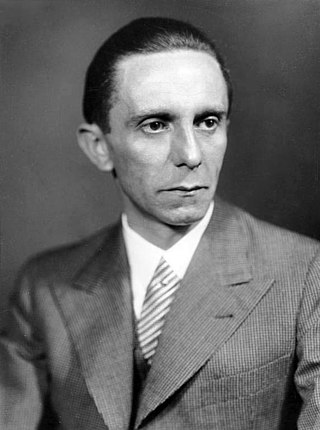
Paul Joseph Goebbels was a German Nazi politician and philologist who was the Gauleiter of Berlin, chief propagandist for the Nazi Party, and then Reich Minister of Propaganda from 1933 to 1945. He was one of Adolf Hitler's closest and most devoted followers, known for his skills in public speaking and his deeply virulent antisemitism which was evident in his publicly voiced views. He advocated progressively harsher discrimination, including the extermination of the Jews in the Holocaust.

Alfred Ernst Rosenberg was a Baltic German Nazi theorist and ideologue. Rosenberg was first introduced to Adolf Hitler by Dietrich Eckart and he held several important posts in the Nazi government. He was the head of the NSDAP Office of Foreign Affairs during the entire rule of Nazi Germany (1933–1945), and led Amt Rosenberg, an official Nazi body for cultural policy and surveillance, between 1934 and 1945. During World War II, Rosenberg was the head of the Reich Ministry for the Occupied Eastern Territories (1941–1945). After the war, he was convicted of crimes against peace; planning, initiating and waging wars of aggression; war crimes; and crimes against humanity at the Nuremberg trials in 1946. He was sentenced to death by hanging and executed on 16 October 1946.

Mit brennender Sorge is an encyclical of Pope Pius XI, issued during the Nazi era on 10 March 1937. Written in German, not the usual Latin, it was smuggled into Germany for fear of censorship and was read from the pulpits of all German Catholic churches on one of the Church's busiest Sundays, Palm Sunday.

Johanna Maria Magdalena "Magda" Goebbels was the wife of Nazi Germany's Propaganda Minister Joseph Goebbels. A prominent member of the Nazi Party, she was a close ally, companion, and political supporter of Adolf Hitler. Some historians refer to her as the unofficial "first lady" of Nazi Germany, while others give that title to Emmy Göring.

The Myth of the Twentieth Century is a 1930 book by Alfred Rosenberg, a Nazi theorist and official who was convicted of crimes against humanity and other crimes at the Nuremberg trials and executed in 1946. Rosenberg was one of the principal ideologues of the Nazi Party and editor of the Nazi newspaper Völkischer Beobachter. In 1941, history professor Peter Viereck wrote: "In molding Germany's 'psychology of frightfulness' Rosenberg wields an influence as powerful as that of the much publicized Goebbels and the much feared Himmler and his secret police."

The propaganda used by the German Nazi Party in the years leading up to and during Adolf Hitler's dictatorship of Germany from 1933 to 1945 was a crucial instrument for acquiring and maintaining power, and for the implementation of Nazi policies.
Nazi Germany was an overwhelmingly Christian nation. A census in May 1939, six years into the Nazi era after the annexation of Austria and Czechoslovakia into Germany, indicates that 54% of the population considered itself Protestant, 41% considered itself Catholic, 3.5% self-identified as Gottgläubig, and 1.5% as "atheist". Protestants were over-represented in the Nazi Party's membership and electorate, and Catholics were under-represented.

Positive Christianity was a religious movement within Nazi Germany which promoted the belief that the racial purity of the German people should be maintained by mixing racialistic Nazi ideology with either fundamental or significant elements of Nicene Christianity. Adolf Hitler used the term in point 24 of the 1920 Nazi Party Platform, stating: "the Party as such represents the viewpoint of Positive Christianity without binding itself to any particular denomination". The Nazi movement had been hostile to Germany's established churches. The new Nazi idea of Positive Christianity allayed the fears of Germany's Christian majority by implying that the Nazi movement was not anti-Christian. That said, in 1937, Hans Kerrl, the Reich Minister for Church Affairs, explained that "Positive Christianity" was not "dependent upon the Apostle's Creed", nor was it dependent on "faith in Christ as the son of God", upon which Christianity relied, rather, it was represented by the Nazi Party: "The Führer is the herald of a new revelation", he said. Hitler's public presentation of Positive Christianity as a traditional Christian faith differed. Despite Hitler's insistence on a unified peace with the Christian churches, to accord with Nazi antisemitism, Positive Christianity advocates also sought to distance themselves from the Jewish origins of Christ and the Christian Bible. Based on such elements, most of Positive Christianity separated itself from traditional Nicene Christianity and as a result, it is in general considered apostate by all mainstream Trinitarian Christian churches, regardless of whether they are Catholic, Eastern Orthodox, or Protestant.

Norsefire is the fictional white supremacist and neo-fascist political party ruling the United Kingdom in Alan Moore and David Lloyd's V for Vendetta comic book/graphic novel series, its 2005 film adaptation, and the 2019 television series Pennyworth.
The religious beliefs of Adolf Hitler, dictator of Nazi Germany from 1933 to 1945, have been a matter of debate. His opinions regarding religious matters changed considerably over time. During the beginning of his political career, Hitler publicly expressed favorable opinions towards traditional Christian ideals, but later abandoned them. Most historians describe his later posture as adversarial to organized Christianity and established Christian denominations. He also criticized atheism.
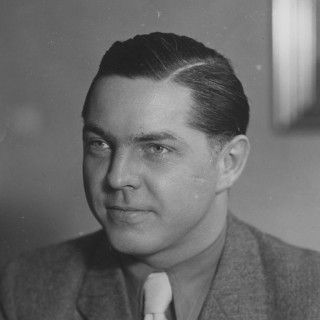
Fritz Hippler was a German filmmaker who ran the film department in the Propaganda Ministry of Nazi Germany, under Joseph Goebbels. He is best known as the director of the propaganda film Der Ewige Jude .

The Goebbels Diaries are a collection of writings by Joseph Goebbels, a leading member of the National Socialist German Workers Party (NSDAP) and the Reich Minister of Public Enlightenment and Propaganda in Adolf Hitler's government from 1933 to 1945. The diaries, which have only recently been published in full in German and are available only in part in English, are a major source for the inner history of the Nazi Party and of its twelve years in power in Germany. The British historian Ian Kershaw wrote in the preface to his biography of Hitler: "For all the caution which must naturally be attached to Goebbels's regularly reported remarks by Hitler ... the immediacy as well as the frequency of the comments makes them a vitally important source of insight into Hitler's thinking and action."
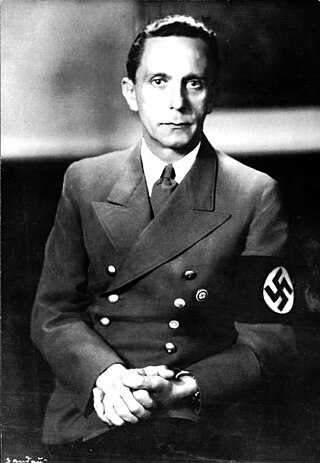
The Reich Ministry for Public Enlightenment and Propaganda, also known simply as the Ministry of Propaganda, controlled the content of the press, literature, visual arts, film, theater, music and radio in Nazi Germany.
Kirchenkampf is a German term which pertains to the situation of the Christian churches in Germany during the Nazi period (1933–1945). Sometimes used ambiguously, the term may refer to one or more of the following different "church struggles":
- The internal dispute within German Protestantism between the German Christians and the Confessing Church over control of the Protestant churches;
- The tensions between the Nazi regime and the Protestant church bodies; and
- The tensions between the Nazi regime and the Catholic Church.
Historians, political scientists and philosophers have studied Nazism with a specific focus on its religious and pseudo-religious aspects. It has been debated whether Nazism would constitute a political religion, and there has also been research on the millenarian, messianic, and occult or esoteric aspects of Nazism.
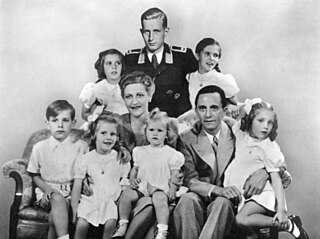
The Goebbels children were the five daughters and one son born to Nazi propaganda minister Joseph Goebbels and his wife Magda Goebbels. The children, born between 1932 and 1940, were murdered by their parents in Berlin on 1 May 1945, the day both parents committed suicide.
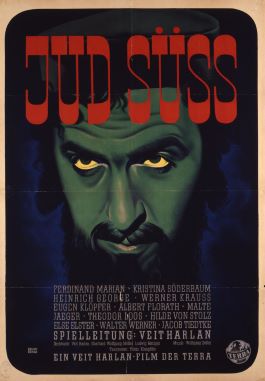
Jud Süß is a 1940 Nazi German historical drama and propaganda film produced by Terra Film at the behest of Joseph Goebbels. It is considered one of the most antisemitic films of all time. The film was directed by Veit Harlan, who wrote the screenplay with Eberhard Wolfgang Möller and Ludwig Metzger. The leading roles were played by Ferdinand Marian and Harlan's wife Kristina Söderbaum; Werner Krauss and Heinrich George played key supporting roles.

Catholic bishops in Nazi Germany differed in their responses to the rise of Nazi Germany, World War II, and the Holocaust during the years 1933–1945. In the 1930s, the Episcopate of the Catholic Church of Germany comprised 6 Archbishops and 19 bishops while German Catholics comprised around one third of the population of Germany served by 20,000 priests. In the lead up to the 1933 Nazi takeover, German Catholic leaders were outspoken in their criticism of Nazism. Following the Nazi takeover, the Catholic Church sought an accord with the Government, was pressured to conform, and faced persecution. The regime had flagrant disregard for the Reich concordat with the Holy See, and the episcopate had various disagreements with the Nazi government, but it never declared an official sanction of the various attempts to overthrow the Hitler regime. Ian Kershaw wrote that the churches "engaged in a bitter war of attrition with the regime, receiving the demonstrative backing of millions of churchgoers. Applause for Church leaders whenever they appeared in public, swollen attendances at events such as Corpus Christi Day processions, and packed church services were outward signs of the struggle of ... especially of the Catholic Church - against Nazi oppression". While the Church ultimately failed to protect its youth organisations and schools, it did have some successes in mobilizing public opinion to alter government policies.
The Roman Catholic Church suffered persecution in Nazi Germany. The Nazis claimed jurisdiction over all collective and social activity. Clergy were watched closely, and frequently denounced, arrested and sent to Nazi concentration camps. Welfare institutions were interfered with or transferred to state control. Catholic schools, press, trade unions, political parties and youth leagues were eradicated. Anti-Catholic propaganda and "morality" trials were staged. Monasteries and convents were targeted for expropriation. Prominent Catholic lay leaders were murdered, and thousands of Catholic activists were arrested.

Adolf Hitler's cult of personality was a prominent feature of Nazi Germany (1933–1945), which began in the 1920s during the early days of the Nazi Party. Based on the Führerprinzip ideology, that the leader is always right, promulgated by incessant Nazi propaganda, and reinforced by Adolf Hitler's success in fixing Germany's economic and unemployment problems by remilitarising during the global Great Depression, his bloodless triumphs in foreign policy prior to World War II, and the rapid military defeat of the Second Polish Republic and the Third French Republic in the early part of the war, it eventually became a central aspect of the Nazi control over the German people.
References
- ↑ Campbell, Kenneth J. (2012). "Joseph Goebbels: Propagandist". American Intelligence Journal. 30 (2): 125–134. ISSN 0883-072X. JSTOR 26202024.
- ↑ Longerich, Peter (2015). Goebbels: A Biography. New York, New York: Random House. p. 16. ISBN 978-1400067510.
- ↑ Hicks, Stephen (2010). Nietzsche and the Nazis, Ockham's Razor Press ISBN 978-0979427077
- ↑ Michael, Joseph Goebbels, Amok Press, 38-40
- ↑ Michael, Joseph Goebbels, Amok Press, 48-59
- ↑ Richard J. Evans (2006). The Third Reich in Power. Penguin Publishing Group. pp. 291–. ISBN 978-1-4406-4930-1.
- ↑ Fest, The Face of the Third Reich, p. 88